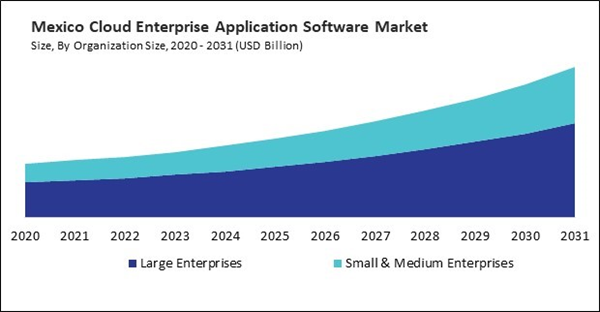The US market dominated the North America Cloud Enterprise Application Software Market by country in 2023, and is expected to continue to be a dominant market till 2031; thereby, achieving a market value of $91.21 billion by 2031. The Canada market is experiencing a CAGR of 11.9% during 2024-2031. Additionally, the Mexico market is expected to exhibit a CAGR of 11.1% during 2024-2031.
Cloud enterprise application software refers to large-scale business software solutions delivered and accessed via cloud computing platforms rather than installed and run on an organization’s servers. These applications are designed to support and automate various enterprise-level processes, such as finance, human resources, supply chain management, customer relationship management, enterprise resource planning (ERP), and more. Unlike traditional software that requires installation on physical hardware within a company’s data center, cloud enterprise applications are hosted in remote data centers managed by cloud service providers like Amazon Web Services (AWS), Microsoft Azure, Google Cloud Platform (GCP), Oracle Cloud, and others. These applications are extremely accessible and scalable, as they can be accessed through the internet, typically through web browsers or mobile applications.
One of the key drivers of this market is the flexibility and scalability that cloud-based solutions provide. Cloud enterprise applications offer businesses unparalleled scalability, enabling them to expand or reduce their operations quickly without significant investments in physical infrastructure. Unlike traditional on-premises systems that require time-consuming hardware upgrades and high upfront costs, cloud solutions allow organizations to scale their computing resources, storage, and user access on demand. This flexibility is helpful to organizations that grow quickly or face seasonal changes, like e-commerce businesses that handle spikes in traffic during peak sales times. With cloud-based applications, companies can maintain smooth operations and deliver consistent customer experiences, even during sudden spikes in demand.
In Mexico, the healthcare sector is driving increased demand for cloud enterprise applications as part of its efforts to modernize healthcare delivery and protect patient data. The Mexican government has prioritized digital health initiatives and introduced regulations to improve data privacy and protection across healthcare institutions. According to Mexico's Ministry of Health, the healthcare sector generates substantial data annually, including electronic health records (EHRs), telemedicine data, and other digital health information. This surge in digital data has created an urgent need for cloud enterprise application software that ensures data integrity, compliance with healthcare regulations, and continuous performance monitoring of critical applications and patient databases. New laws require healthcare providers to maintain digital backups and enforce stringent monitoring of medical records to prevent unauthorized access and data loss. Consequently, the region presents lucrative growth opportunities for the cloud enterprise application software market throughout the forecast period.
List of Key Companies Profiled
- Epicor Software Corporation
- Hewlett Packard Enterprise Company
- IBM Corporation
- Microsoft Corporation
- Oracle Corporation
- Accenture PLC
- SAP SE
- Salesforce, Inc.
- Zoho Corporation Pvt. Ltd.
- Amazon Web Services, Inc. (Amazon.com, Inc.)
Market Report Segmentation
By Organization Size
- Large Enterprises
- Small & Medium Enterprises
By Deployment Mode
- Public Cloud
- Hybrid Cloud
- Private Cloud
By End User
- Manufacturing & Services
- BFSI
- Healthcare
- Retail
- Government
- Oil & Gas
- Telecom & Others
By Solution
- Customer Relationship Management
- Enterprise Resource Planning
- Supply Chain Management
- Business Intelligence
- Content Management System
- Enterprise Asset Management
- Business Process Management
- Web conferencing
- Other Solution
By Country
- US
- Canada
- Mexico
- Rest of North America
Table of Contents
Companies Mentioned
- Epicor Software Corporation
- Hewlett Packard Enterprise Company
- IBM Corporation
- Microsoft Corporation
- Oracle Corporation
- Accenture PLC
- SAP SE
- Salesforce, Inc.
- Zoho Corporation Pvt. Ltd.
- Amazon Web Services, Inc. (Amazon.com, Inc.)









